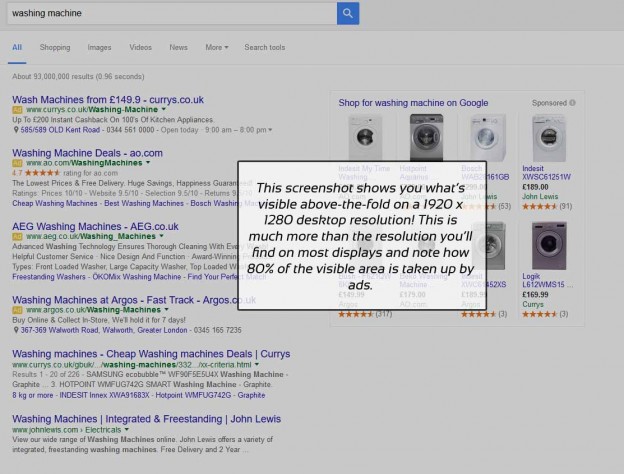Notice that ads on the right from Google search results page have vanished since the last weekend?
If you keep up with the world of online marketing you may be aware already that Google has been carrying out tests for the last 5 years or so on displaying results for your queries without the ads on the right.
Over the weekend, those tests have now been formalized and Google has officially removed the ads from the right in an effort to bring the desktop user experience closer to mobile. The change began rolling out over the weekend and is expected to finish by today.
The above screenshot shows you what’s visible above-the-fold on a 1920 x 1280 desktop resolution! This is much more than the resolution you’ll find on most displays and note how 80% of the visible area is taken up by ads.
An overview of these changes:
- Ads from the right removed for most queries
- Another ad on top will show up which makes the total number of ads above organic results to 4. However, this is apparently only going to be the case for highly commercial queries such as “London Hotels” “car insurance” and so on
- Product Listing ad boxes will show up on the right
How this change will affect advertisers
Whilst this is good news for users, businesses, Google’s core target market can expect their AdWords budget to take a serious hit as the bid to be part of page 1 has just become all the more competitive, with much less room available. Lets take a closer look:
- Removing the ads from the right means there’s now much less real estate available for ads which should drive up the £ Cost Per Clicks for the available slots
- The bar for Quality Score, landing pages relevance and other KPIs has been raised and advertisers will need to be even more creative if their ads are to see the light of the top of page 1
- If you’re a product seller, expect to feel the impact even more. Already, for competitive product searches, you’re likely to find the biggest retailers like Argos, John Lewis and the like on the Product Listing ad. In this case, as a small retailer your only choice was text ads.
- If you’re a service seller without any organic page 1 rankings, your CPCs could increase anywhere from 20 – 60%!
What can advertisers do about the change?
- If you’re an online marketer chances are you know about Search Engine Optimisation (SEO) and if you’re not carrying it out already, now it’s more important than ever to get started. With these changes, the Cost Per Acquisition (CPA) of leads from SEO vs PPC should become even more cost-effective and sustainable.
- If you’re offering multiple services, some more competitive than others, you may wish to explore pushing the latter or niche services. The ad competition should be lower and you may still be able to get similar CPCs as before
- At the risk of sounding bias, a professionally managed PPC campaign becomes even more important to ensure your CPCs don’t spiral out of control
How long before Google rebrands itself from a search engine to an ad engine?!
Here’s some other links on the web on related news:
- http://www.digitaltrends.com/web/googles-desktop-search-results-pages-will-no-longer-have-ads-in-the-right-sidebar/
- http://searchengineland.com/google-no-ads-right-side-of-desktop-search-results-242997
- http://recode.net/2016/02/20/google-makes-desktop-search-look-more-mobile-ish-to-milk-more-shopping-ads-cash/
- http://economictimes.indiatimes.com/industry/services/advertising/google-is-changing-how-you-see-ads/articleshow/51084792.cms
- http://www.theverge.com/2016/2/20/11077472/google-search-ads-change-position
For help with your digital marketing campaigns, whether that’s Google Ads, Facebook, Search Engine Optimisation, LinkedIn or Social Media, get in touch with us today. Or, view all our services here.





